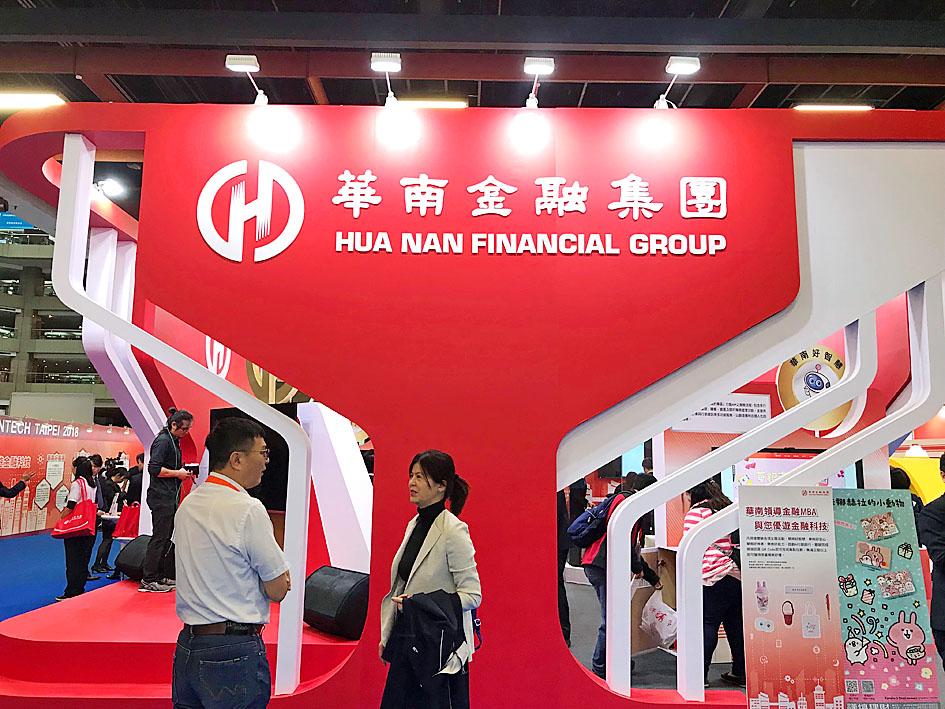State-run Hua Nan Financial Holding Co (華南金控) aims to expand fee incomes, investment gains, overseas operations and lending to small and medium enterprises this year, it said on Wednesday.
The bank-focused conglomerate set the goal at a meeting of managers from different divisions after net income slumped to NT$8.66 billion (US$305.94 million) last year, or earnings per share of NT$0.67.
The results suggested a 48.85 percent retreat from earnings per share of NT$1.31 a year earlier, attributable mainly to losses at its subsidiary Hua Nan Securities Co (華南永昌證券).

Photo: Chen Mei-ying, Taipei Times
The securities arm failed to reverse huge losses from March last year, when global exchanges tumbled following lockdowns and interest rate cuts introduced to ease the effects of the COVID-19 pandemic.
Hua Nan Securities finished last year with losses of NT$3.63 billion, wiping out the group’s income by NT$5.57 per share.
The main subsidiary, Hua Nan Commercial Bank (華南銀行), grew its lending, wealth management and other operations amid ultra-low interest rates and wild market volatility, Hua Nan Financial Holding chairman Derek Chang (張雲鵬) said.
The hostile macro-environment drove up funding costs and weighed on interest spread, but Hua Nan Bank posted net profit of NT$12.46 billion, or earnings per share of NT$1.45, Chang said.
Chang urged the bank to pursue further growth in overseas assets, investment gains, fee incomes and loans to small and medium companies.
Hua Nan Bank should seek to improve business at its overseas branches while monitoring asset quality, he said.
In the meantime, the state-run lender said it would support the government’s effort to shore up companies in strategically important industries.

BYPASSING CHINA TARIFFS: In the first five months of this year, Foxconn sent US$4.4bn of iPhones to the US from India, compared with US$3.7bn in the whole of last year Nearly all the iPhones exported by Foxconn Technology Group (富士康科技集團) from India went to the US between March and last month, customs data showed, far above last year’s average of 50 percent and a clear sign of Apple Inc’s efforts to bypass high US tariffs imposed on China. The numbers, being reported by Reuters for the first time, show that Apple has realigned its India exports to almost exclusively serve the US market, when previously the devices were more widely distributed to nations including the Netherlands and the Czech Republic. During March to last month, Foxconn, known as Hon Hai Precision Industry

Taiwan Semiconductor Manufacturing Co (TSMC, 台積電) and the University of Tokyo (UTokyo) yesterday announced the launch of the TSMC-UTokyo Lab to promote advanced semiconductor research, education and talent development. The lab is TSMC’s first laboratory collaboration with a university outside Taiwan, the company said in a statement. The lab would leverage “the extensive knowledge, experience, and creativity” of both institutions, the company said. It is located in the Asano Section of UTokyo’s Hongo, Tokyo, campus and would be managed by UTokyo faculty, guided by directors from UTokyo and TSMC, the company said. TSMC began working with UTokyo in 2019, resulting in 21 research projects,

Ashton Hall’s morning routine involves dunking his head in iced Saratoga Spring Water. For the company that sells the bottled water — Hall’s brand of choice for drinking, brushing his teeth and submerging himself — that is fantastic news. “We’re so thankful to this incredible fitness influencer called Ashton Hall,” Saratoga owner Primo Brands Corp’s CEO Robbert Rietbroek said on an earnings call after Hall’s morning routine video went viral. “He really helped put our brand on the map.” Primo Brands, which was not affiliated with Hall when he made his video, is among the increasing number of companies benefiting from influencer

Quanta Computer Inc (廣達) chairman Barry Lam (林百里) yesterday expressed a downbeat view about the prospects of humanoid robots, given high manufacturing costs and a lack of target customers. Despite rising demand and high expectations for humanoid robots, high research-and-development costs and uncertain profitability remain major concerns, Lam told reporters following the company’s annual shareholders’ meeting in Taoyuan. “Since it seems a bit unworthy to use such high-cost robots to do household chores, I believe robots designed for specific purposes would be more valuable and present a better business opportunity,” Lam said Instead of investing in humanoid robots, Quanta has opted to invest